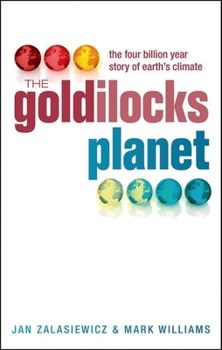The Goldilocks Planet: The Four Billion Year Story of Earth's Climate
Select Format
Select Condition 
Book Overview
Climate change is a major topic of concern today and will be so for the foreseeable future, as predicted changes in global temperatures, rainfall, and sea level continue to take place. But as Jan Zalasiewicz and Mark Williams reveal in The Goldilocks Planet, the climatic changes we are experiencing today hardly compare to the changes the Earth has seen over the last 4.5 billion years. Indeed, the vast history that the authors relate here is dramatic and often abrupt--with massive changes in global and regional climate, from bitterly cold to sweltering hot, from arid to humid. They introduce us to the Cryogenian period, the days of Snowball Earth seven hundred million years ago, when ice spread to cover the world, then melted abruptly amid such dramatic climatic turbulence that hurricanes raged across the Earth. We read about the Carboniferous, with tropical jungles at the equator (where Pennsylvania is now) and the Cretaceous Period, when the polar regions saw not ice but dense conifer forests of cypress and redwood, with gingkos and ferns. The authors also show how this history can be read from clues preserved in the Earth's strata. The evidence is abundant, though always incomplete--and often baffling, puzzling, infuriating, tantalizing, seemingly contradictory. Geologists, though, are becoming ever more ingenious at deciphering this evidence, and the story of the Earth's climate is now being reconstructed in ever-greater detail--maybe even providing us with clues to the future of contemporary climate change. And through all of this, the authors conclude, the Earth has remained perfectly habitable--in stark contrast to its planetary neighbors. Not too hot, not too cold; not too dry, not too wet--"the Goldilocks planet."
Format:Hardcover
Language:English
ISBN:0199593574
ISBN13:9780199593576
Release Date:May 2012
Publisher:Oxford University Press, USA
Length:303 Pages
Weight:0.90 lbs.
Dimensions:1.3" x 5.7" x 8.5"
Customer Reviews
0 rating





